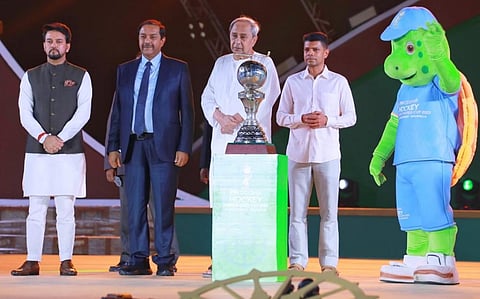This time for Odisha: Hockey World Cup, investments surge. And culture?
This is the first of a two-part series. Read the second part
2023 is a dream welcome for Odisha. The state has started the New Year with the Men’s Hockey World Cup.
The mega global event is sure to bolster the state’s image as a state capable of organising and conducting events on such a large scale to complement India’s superpower pitch and fervor. This will reflect cooperative federalism in true spirit.
Rourkela is now home to the world’s biggest hockey stadium and this is a fitting tribute to the unmatchable hockey prowess of our indigenous communities, not only in Sundargarh but in the entire country.
The state, after the world cup, will emerge as an indelible marquee dot on the global sports map. It is poised to be the country’s sports hub.
From here, the ‘Odisha soft power’ narrative should be raised further. Sports has been one of the priority sectors for the state in the last decade and the budget has grown significantly between 2010 and 2022, almost 14 times.
The young population in the state is at an all-time high with nearly 36 per cent citizens aged 14-34. This is a coveted demographic dividend for the state and holds the promise to propel it into a higher growth orbit.
Sports will motivate youth towards a health-conscious, inspirational and purposeful future. 2023 will give them a chance closer home to realise the effect of sports and allied career opportunities too.
The sports industry has the potential to contribute about 1-2 per cent to the state gross domestic product. The ecosystem includes sports infrastructure, sports events, sports hospitality, training, manufacturing and retail of sports goods.
The economic benefit of sports is much smaller in comparison to the social development it ushers in.
Hypertension and diabetes have assumed epidemic proportions in Odisha with a long-term impact on health and well-being of the population.
Over 25 per cent men and 22 per cent women aged above 15 years have high blood pressure (BP). Around six per cent men and five per cent women have severely elevated BP.
Hypertension is almost getting uncontrollable. Non-communicable diseases (NCD) like hypertension and diabetes are lifelong illnesses that adversely affect the quality of life and severely debilitate productivity and individual creativity.
In 2023, Odisha has to make physical education a common practice in schools, colleges and social clubs. This, over a period of time, will provide cognitive content to develop motor skills, knowledge and behaviours for physical activity and physical fitness.
The fundamental to Odisha’s growth will be the ability and confidence to be physically active for a lifetime. What is the point of being a sports hub, without able people in the state itself?
Health and culture
In 2023, we pledge to make health a key part of all our economic growth discussions. Being the sports hub of the country would mean first taking care of the health and culture of the state.
Fewer people should die prematurely, so that the working-age population will increase. When people are healthier, absences from sickness will decline and workers will be less distracted by their own sick conditions or those of their families and acquaintances.
Fewer workers will retire early due to health conditions. Consumption of tobacco, alcohol and cannabis in Odisha is much higher than the national average.
Tobacco consumption among 15 plus age groups is alarmingly high at 38.41 per cent. Similarly, in alcohol consumption, Odisha records 16.13 per cent. In cannabis usage, Odisha is in the red zone.
The recent ‘Make in Odisha’ conclave has generated investment intents of Rs 10.5 trillion, with an employment potential for 1,037,701 people.
Odisha possesses bountiful resources to attract investments. What are investments? They are capital put in the state to reap higher returns.
But what about our people? What about our culture?
With little effort, we can attract huge investments to Odisha, because nowhere else in the country is there such concentration of high-quality minerals which will help build future economy of India and enrich corporates.
But it is only with sustained, dedicated and painstaking efforts that we will be able to keep our pristine and valued culture intact.
Industrial investors have queued up because they foresee super normal profits. But Odisha’s sole dependency on rental economy will paralyse the people and erode the culture of the state.
Only industry-led growth will skew our human development. Have we ever sensitised industries on Odia culture? This goes beyond writing a cheque for an Odissi programme in Rabindra Mandap.
Have the mega conglomerates partnered in any research work on culture? Is there any public private partnership on restoring and preserving art and artefacts?
Only a miniscule percentage of the billions which have come and are on the anvil, go to the institutions like the Government College of Art and Craft, Khallikote, which is one of the leading visual art institutions in the country or to Balasore Art and Crafts College.
Has any corporate social responsibility of any of the extraction companies sponsored our young artistes or offered fellowships in national and global institutions?
Upcoming artists like Laxmipriya Panigrahi, Digbijayee Khatua, Pinaki Mohanty, Sibdas Sengupta, Julius Das, Suryakant Swain, ceramist Saroj Rout, young film makers and many more need handholding and international exposure.
All the FDIs are flowing into the state. Can they not support our creative talents to reach for the stars?
Read more:
Charudutta Panigrahi is a policy advisor in sectoral reforms, the Chairman of FIDR, writer and political observer
Views expressed are the author’s own and don’t necessarily reflect those of Down To Earth

